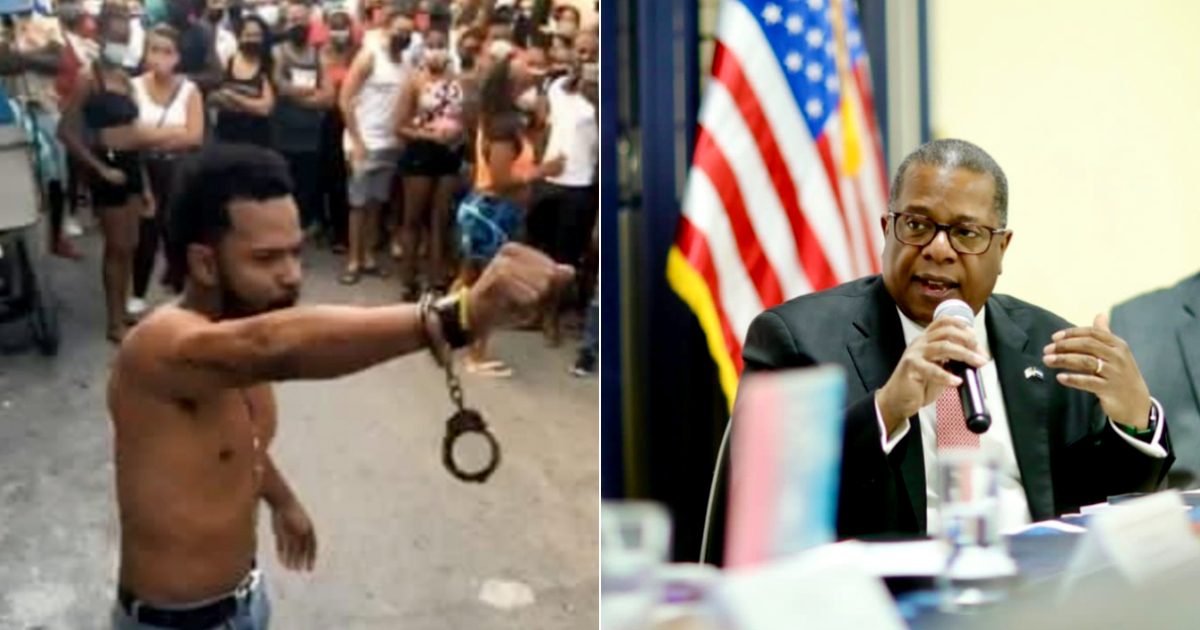
The United States reiterated to the Cuban authorities its request in favor of therelease of political prisoners who remain in the regime's prisons.
This was stated this Wednesday by the Undersecretary of State for Western Hemisphere Affairs,Brian A. Nichols, through a publication on his social networks, in which he urged the Havana regime to release the more than a thousand prisoners of conscience that it keeps imprisoned.
“A week after the tragic death of the 9/11 protester,Luis Barrios Diaz, being detained, the international community must remain focused on the inhumane treatment and terrible conditions suffered by Cuban political prisoners. We call on the Cuban government to release all political prisoners,” Nichols said via X.
Against the background of the death of Barrios Díaz, as a result of the neglect of their obligations by the authorities and prison officials, the United States once again demanded the release of the political prisoners, and warned again about “the inhumane treatment” that they receive in prison.
Barrios Díaz, 37, died on the afternoon of November 19 at La Covadonga Hospital, in Havana, as a result of respiratory complications.
The prisoner had presented worrying symptoms since August. He was admitted to the infirmary of prison 1580 in San Miguel del Padrón and later transferred to the aforementioned hospital to receive specialized care.
However, despite medical warnings, the authorities decided to return him to prison, citing the lack of resources for transfer and hospital surveillance. That decision led to a critical deterioration in his health and, ultimately, his death.
“We are outraged to hear the news of the death of the political prisoner of 11J, Luis Barrios Díaz, while he was imprisoned in Cuba. We call on the Cuban government to respect the human rights of everyone, including the rights of political prisoners and people unjustly detained. “No one should be imprisoned in Cuba or anywhere for publicly expressing their political opinions,” said the US Embassy in Cuba upon hearing the news.
These statements provoked a reaction from the Cuban Foreign Ministry. In a publication on her social networks, the deputy director general of the United States Directorate of the Ministry of Foreign Affairs of Cuba,Johana Tablada, stated that the United States “tries to use this fact for his deceptive politicking”.
In addition, he accused the US government of “championing indifference to his scandals and abuses and those of his allies,” and added that “it once again displays hypocrisy, double standards and demagoguery.”
The scandalous death of the 9/11 protester took place just hours before the arrival in Havana of the Special Representative of theEuropean Union (EU) for Human Rights (HR),Eamon Gilmore, who co-directed the IV Human Rights Dialogue between Cuba and the EU, and was in charge of the High Representative,Joseph Borrell, of "To analize the situation created before, during and after the demonstrations and arrests” of thehistoric and massive outbreak of popular protests.
During his stay, Gilmoreheld meetings with representatives of the regime and its “new actors”,with relatives of four political prisoners, and closed the visit witha meeting with the ruler Miguel Díaz-Canel, leaving a feeling of uncertainty in Cuban civil society about its insistent claims about the situation of political prisoners and their families.
After the visit,Yindra Elizastigui Jardines, mother of political prisonerLuis Robles and one of the relatives who was able to meet with Gilmore declared a hunger strike for the release of her son.
“I do this for the freedom of my son, for the freedom of all Cuban political prisoners. "who are unjustly imprisoned, who have suffered mistreatment of all kinds and also on behalf of the families we have suffered," he clarified in a direct transmission from his Facebook account.
What do you think?
COMMENTFiled in: